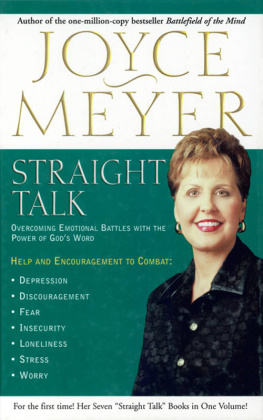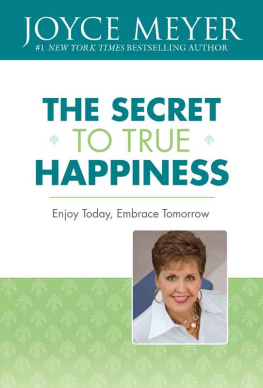Copyright 2020 by Joyce Meyer.
Cover copyright 2020 by Hachette Book Group, Inc.
Hachette Book Group supports the right to free expression and the value of copyright. The purpose of copyright is to encourage writers and artists to produce the creative works that enrich our culture.
The scanning, uploading, and distribution of this book without permission is a theft of the authors intellectual property. If you would like permission to use material from the book (other than for review purposes), please contact permissions@hbgusa.com. Thank you for your support of the authors rights.
FaithWords
Hachette Book Group
1290 Avenue of the Americas, New York, NY 10104
faithwords.com
twitter.com/faithwords
First Edition: June 2020
FaithWords is a division of Hachette Book Group, Inc.
The FaithWords name and logo are trademarks of Hachette Book Group, Inc.
The publisher is not responsible for websites (or their content) that are not owned by the publisher.
The Hachette Speakers Bureau provides a wide range of authors for speaking events. To find out more, go to www.hachettespeakersbureau.com or call (866) 3766591.
Unless otherwise noted, Scripture quotations are taken from the Holy Bible, New International Version, NIV. Copyright 1973, 1978, 1984, 2011 by Biblica, Inc. Used by permission of Zondervan. All rights reserved worldwide. www.zondervan.com The NIV and New International Version are trademarks registered in the United States Patent and Trademark Office by Biblica, Inc. | Scripture quotations marked AMP from the Amplified Bible, Copyright 2015 by The Lockman Foundation. Used by permission. www.Lockman.org. | Scripture quotations marked AMPC are taken from the Amplified Bible, Copyright 1954, 1958, 1962, 1964, 1965, 1987 by The Lockman Foundation. Used by permission. www.Lockman.org. | Scripture quotations marked NASB are taken from the New American Standard Bible. Copyright 1960, 1962, 1963, 1968, 1971, 1972, 1973, 1975, 1977, 1995 by the Lockman Foundation. Used by permission. www.Lockman.org. | Scripture quotations marked NKJV are taken from the New King James Version. Copyright 1982 by Thomas Nelson. Used by permission. All rights reserved.
Library of Congress Cataloging-in-Publication Data has been applied for.
ISBNs: 978-1-5460-1349-5 (paper over board), 978-1-5460-1347-1 (ebook), 978-1-5460-1740-0 (international)
E3-20200511-JV-NF-ORI
If you change your habits, youll change your life. That may sound like a bold statement, but I believe its true. To a great degree, your life consists of your habitsthe things you think, say, and do repeatedly. The way you spend your time, your money, and your energy each day is largely based on habits. If youre like most people, you have some kind of routine for every day. Even if the daily routine varies, you may have a routine for each weekcertain things you want to do and certain things you have to do. Over time, those things have become habits for you.
All kinds of habits are at work in our physical lives, sometimes without our even realizing it. We have a habit of going to work, a habit of brushing our teeth, a habit of seeing the doctor for an annual physical, a habit of taking out the trash on certain days of the week, habits for cooking and cleaning at home, and habits with friends and family. We may also have habits regarding exercise or lack of exercise, or habits pertaining to the amount of time we spend watching television or looking at the screen of an electronic device.
We also have habits in our minds. We may have positive mental attitudes and thought patterns that cause us to be confident in everything we do. Or we may have habits of negative thinking that make everything feel like a chore. We may have ways of thinking about resources, such as money or time, that allow us to use them wisely, or ways of thinking that keep us continually in debt or stressed because were running late.
In addition to our physical and mental habits, we also have many emotional habits. We may be in the habit of feeling sorry for ourselves when we dont get what we want. We may have a habit of becoming fearful when we hear thunder and see lightning. An emotional habit of anger or judgment toward a certain person may be ingrained in us. Or, when we see people who are obviously needy or struggling in life, we may have a habit of feeling compassion and reaching out to help them.
The habits I have mentioned are only a few of the habits that determine how we live our lives. Im sure, if you stop and think about it, you could identify a lot of habits you live by. Some of those habits would be good, such as keeping your car clean, using coupons to save money at the grocery store, or visiting someone in a nursing home each week, and some would be ones youd like to change, such as biting your nails, drinking too much caffeine, or being easily frustrated. The good news about habits youd like to break is that they can always be changed! Every day you live, you have a chance to develop a new habit or to break a bad one and replace it with a good one.
When I hear women talk about their habits, they usually dont mention their good ones, but they do talk about wanting to change their bad ones. Ive never met anyone who didnt have some good habits, but Ive also never met a woman who didnt have other habits she would like to change. All of us have a mixture of good habits and not-so-good ones, so we all have room to improve.
In this book, I dont simply want to talk about changing habits, though you will read a lot about that. I also want to specifically explore with you the habits of a godly womannot just any woman, but one who wants to keep growing in God and live every aspect of her life as He would have her to live it. The book doesnt address every single habit of a godly woman, but it does focus on some that are most important and that will help you go far as you seek to become a more godly woman.
Many adjectives can describe a woman. She can be successful. She can be beautiful. She can be smart. She can be a talented artist or singer or homemaker. She can be gifted in all kinds of ways and have lots of different attributes. But the best quality for any woman to have is godliness. I believe a godly woman is someone who is confident, peaceful, and enjoys life. She has developed habits that make her like Christ in her behavior, and she delights in continuing to grow in Him. She represents Him well everywhere she goes and is a blessing to everyone she comes in contact with.
Becoming a godly woman is a process. It doesnt happen overnight. The apostle Paul says we are being transformed into his image with ever-increasing glory (2 Cor. 3:18), which is a New Testament way of saying that God keeps changing us, continually taking us from one level of spiritual maturity to the next. One way to be disciplined and diligent about our spiritual growth is to purposefully develop habits that will help us become more and more godly. Instead of spending our time trying to break habits, I suggest focusing on making good habits. Focusing our energy in positive directions is usually a better path to change than continually focusing on our weaknesses, which can cause us to lose heart and remain stuck in the very habits we most need to eliminate. Through staying focused on positive change, we move toward becoming the people God wants us to be, and we get to experience the joy and sense of purpose that comes with fulfilling His plans and purposes for our lives.
Gods desire is for you and me to be conformed to the image of his Son (Rom. 8:29). When I first read this verse, I read it in the Amplified Bible, Classic Edition, which helped me understand that being conformed to the image of Christ is to share inwardly His likeness. God is ready and willing to help us become more like Jesus by the power of the Holy Spirit, but He wont do it all for us. We need to be obedient to His direction and work with the Holy Spirit to develop godly habits. Ive written this book to help you do that.
















